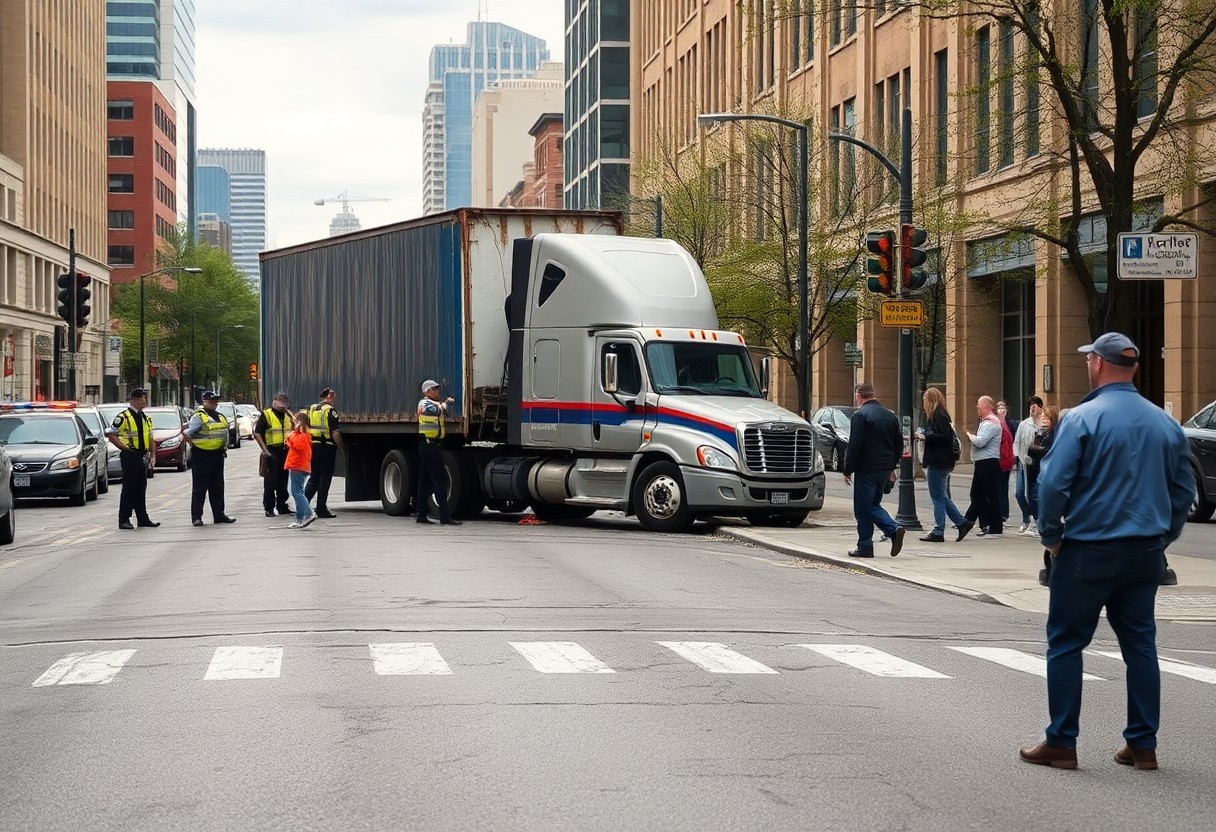This guide will help you navigate the emotional aftermath of a truck accident in Birmingham, a challenging and often overwhelming experience. You may feel a range of intense emotions such as anxiety, anger, or sadness, and it’s important to acknowledge these feelings. Knowing how to process your trauma can greatly improve your healing journey. By employing effective strategies and seeking support, you can work towards regaining a sense of peace and normalcy in your life. Let’s explore practical steps to support your emotional well-being after such an incident.
Understanding Emotional Trauma
To navigate the emotional aftermath of a truck accident, it’s imperative to understand the profound impact of emotional trauma. This can arise from the distressing experience of the accident itself or the ongoing repercussions that can affect your daily life. Emotional trauma can manifest in various ways, leading to feelings of anxiety, fear, and uncertainty. Acknowledging this trauma is the first step in your recovery journey.
Signs and Symptoms of Emotional Trauma
There’s a range of signs and symptoms that may indicate emotional trauma following your truck accident. You might experience:
- Persistent anxiety
- Flashbacks or intrusive thoughts
- Difficulty sleeping
- Withdrawal from social activities
It’s important to recognize that these symptoms can significantly interfere with your daily functioning.
Factors Contributing to Trauma After a Truck Accident
Any number of factors can influence the extent of trauma experienced after a truck accident. These include:
- Severity of the accident
- Your personal history with trauma
- Support system availability
- Coping mechanisms
Perceiving these contributing factors can help you understand your emotional responses and address them accordingly.
Another critical aspect is how these factors interact with each other. For instance, if you’ve previously faced traumatic experiences, you may be more vulnerable to feeling overwhelmed after an accident. A strong support system can mitigate some effects, making it easier for you to process your emotions. On the other hand, lacking these support systems often exacerbates your feelings of isolation and distress. Perceiving these connections can empower you on your road to recovery.
How to Cope with Emotional Trauma
Some individuals may experience overwhelming emotions after a truck accident, which can manifest as anxiety, depression, or confusion. It’s important to acknowledge these feelings and understand that healing takes time. You can begin to cope with emotional trauma by practicing self-care, engaging in calming activities, and seeking out support from friends and loved ones, all of which can lead to a healthier recovery process.
Seeking Professional Help
An important step in managing emotional trauma is consulting a mental health professional. Therapists and counselors can provide you with effective coping strategies and a safe space to express your feelings. They can assist you in processing your experiences, ensuring that you don’t have to navigate this journey alone.
Utilizing Support Systems
Clearly, you don’t have to face emotional trauma alone. Support systems, such as family, friends, or support groups, can be invaluable as you work through your feelings. Surrounding yourself with understanding and empathetic individuals can help validate your experiences and promote healing. Connecting with others who have faced similar challenges can also foster a sense of community and belonging, enhancing your recovery process as you share your journey and learn from one another.
Trauma can lead to feelings of isolation, but utilizing support systems can significantly alter your experience. Develop strong connections with compassionate friends or family members, and do not hesitate to lean on them during difficult moments. Explore local or online support groups where you can interact with others who have undergone similar experiences. Engaging in these communities not only offers validation but also helps you realize that you are not alone in your struggles, leading to a more positive and supportive healing environment.

Tips for Self-Care and Recovery
Clearly, navigating the emotional aftermath of a truck accident requires deliberate efforts towards self-care and recovery. Focus on enhancing your well-being by implementing the following practices:
- Prioritize healthy sleep patterns
- Maintain a balanced diet
- Establish a support network of friends and family
- Set aside time for hobbies and enjoyable activities
- Consider professional counseling if needed
Assume that taking these steps will help you regain your emotional balance and support long-term healing.
Practicing Mindfulness and Relaxation Techniques
An effective way to cope with emotional trauma is by incorporating mindfulness and relaxation techniques into your daily routine. These practices can help you ground yourself, enabling you to connect with the present moment and decrease feelings of anxiety. Techniques such as deep breathing, meditation, or guided imagery can promote a sense of peace and enhance your emotional resilience.
Engaging in Physical Activity
Any form of physical activity can significantly alleviate emotional distress following a truck accident. Whether it’s a daily walk, yoga sessions, or team sports, moving your body helps release harmful stress and boost endorphin levels. Regular exercise can improve your mood and serve as a positive coping mechanism, encouraging you to regain a sense of control over your life. Engaging in sports or group activities can also foster social connections, providing you with the support necessary for healing.
Techniques like aerobics or weight training can elevate your energy levels and enhance your overall emotional and physical health. Just be aware, ensuring you do not overexert yourself, especially if you’re feeling physically drained after the accident. Finding a balance is vital; focus on moderate activities that you enjoy. It’s important to prioritize consistency over intensity, as participating in enjoyable physical activities can greatly improve your emotional well-being and help you recover from trauma in a positive way.
Importance of Open Communication
Keep the lines of communication open to foster healing after your truck accident. Sharing your thoughts and feelings can be immensely beneficial in managing your emotional trauma. Whether it’s with friends, family, or professionals, expressing yourself creates a supportive environment where you can process your experiences and feelings more effectively.
Talking About Your Feelings
Any discussion around your feelings can help lighten the emotional burden you carry after an accident. It’s vital to acknowledge your emotions, whether they are sadness, anger, or fear. Engaging in conversations about how you feel can pave the way for understanding and clarity, ultimately aiding your recovery journey.
Finding the Right Support Network
With the right support network, you can navigate through your emotional trauma more effectively. Surround yourself with compassionate individuals, whether they are friends, family, or support groups, who understand what you’re going through and can offer a listening ear or advice when needed.
A strong support network can significantly impact your emotional recovery. Connecting with people who have had similar experiences fosters an environment of understanding and encouragement. Look for support groups in your area or online, as these can provide a safe space to share your story. Additionally, therapists or counselors can offer expert guidance. This professional support is vital in helping you process your feelings, leading to a more effective recovery.
Long-Term Strategies for Healing
After experiencing a truck accident, it’s vital to focus on long-term strategies for emotional healing. Building resilience takes time and patience, so incorporating consistent practices such as therapy, mindfulness, and support groups can significantly enhance your recovery journey. Allow yourself the space to explore new coping mechanisms and connect with others who share similar experiences to rebuild a sense of normalcy in your life.
Setting Realistic Expectations for Recovery
Even in the midst of your healing journey, it’s important to acknowledge that recovery will involve ups and downs. You may experience good days and bad days, and understanding that it’s a gradual process can help prevent feelings of frustration or disappointment. Establishing practical timelines for your emotional recovery will enable you to stay focused while adapting to your progress.
Creating a Personal Recovery Plan
Clearly defining your path to recovery can empower you to take charge of your emotional well-being. A personal recovery plan should include short-term goals, practices for self-care, and methods for monitoring your emotional state. Consider prioritizing activities that promote relaxation, such as physical exercise or pursuing hobbies you enjoy, while also integrating therapy sessions or support networks.
Recovery is a multifaceted journey that requires you to actively engage in self-discovery and emotional management. Start by identifying specific goals you want to achieve and breakdown larger tasks into manageable steps. Incorporating daily routines and tracking your progress can help you stay motivated. In addition, be open to adjusting your plan as you evolve through different stages of healing. This customizable approach will empower you to take the necessary steps to reclaim your emotional health and move forward after your accident.
When to Seek Legal Advice
Many individuals underestimate the impact of emotional trauma after a truck accident and may delay seeking legal advice. If you find yourself struggling to cope with anxiety, depression, or other emotional challenges, it is imperative to consult a legal professional without delay. They can help ensure that you get the support you need and may assist in pursuing compensation for your suffering, which can aid in your recovery process.
Understanding Your Rights
You have the right to seek compensation for emotional distress stemming from a truck accident. This includes medical expenses for therapy, lost wages due to inability to work, and general pain and suffering. Knowing your rights is the first step towards healing and regaining control of your life.
The Role of Legal Counsel in Recovery
With the guidance of a knowledgeable attorney, you can better navigate the complexities of your case. They can advocate for your needs and ensure that all aspects of your emotional and financial recovery are considered.
A skilled attorney will not only assess your case but also help you gather pertinent evidence to support your claims. They are experienced in negotiating with insurance companies and can strive to secure a fair settlement that accurately reflects the impact of your trauma. By eliminating the stress of legal proceedings from the equation, you can focus on healing and reclaiming your life, ensuring that you receive the support you deserve during this challenging time.
Summing up
With this in mind, it’s important to acknowledge and address the emotional trauma you may experience after a truck accident in Birmingham. Seek professional help through therapy or counseling, engage with support groups, and take care of your physical health to aid in your emotional recovery. Utilize coping strategies like mindfulness and journaling to process your feelings. Surround yourself with supportive friends and family who understand what you’re going through. Prioritizing your mental well-being is key to navigating the challenges that follow a traumatic experience.


















